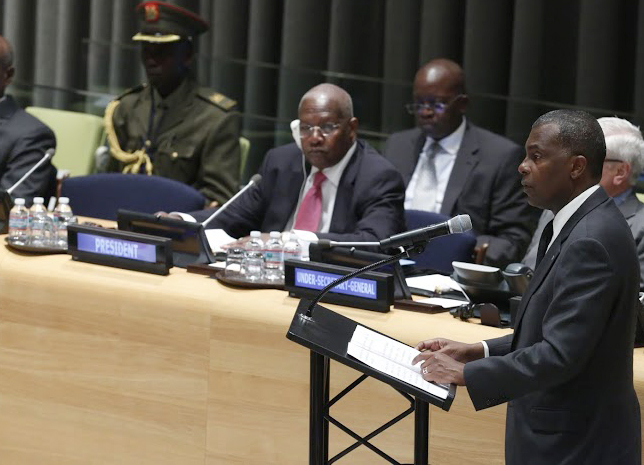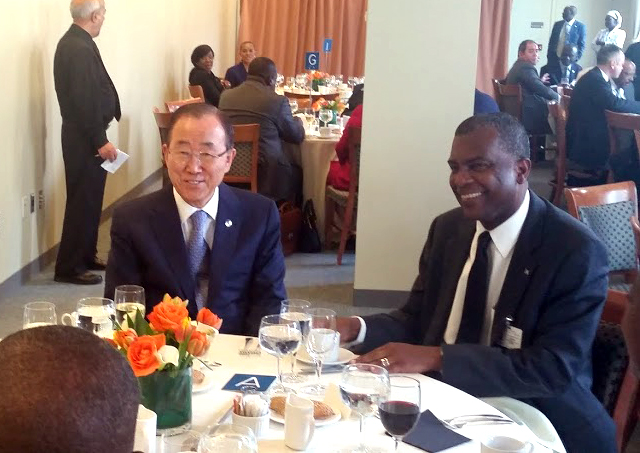
Bahamas Minister of Foreign Affairs and Immigration Fred Mitchell is pictured at the podium at right as he addressed the United Nations in New York on behalf of the Caribbean Community (CARICOM) on Monday, May 4, 2015. He was filling in for Bahamas Prime Minister, the Rt. Hon. Perry G. Christie. From left are President Yoweri Museveni of Uganda and President of the General Assembly of the UN Sam Kutesa.
|
NEW YORK (May 4, 2015) - High-level Thematic Debate
on
Strengthening cooperation between the
United Nations
and regional and sub-regional
organizations
Statement by
The Honourable Frederick A. Mitchell,
M.P.
Minister of Foreign Affairs and
Immigration
on behalf of
the Caribbean Community (CARICOM):
Mr.
President, Mr.
Secretary-General, H.
E. Mr. Museveni, President of Uganda, Distinguished
Colleagues, Heads
of Regional and Sub-regional Organizations, Delegates,
The Bahamas, in its capacity as current Chair
of the Heads of Government of the Caribbean Community (CARICOM), and on behalf
of the Community’s 14 Member States, thank you, Mr. President, for the invitation to participate in this high-level
thematic debate. Ours is a Community that hold the United Nations system in
high esteem, and value our mutually beneficial cooperative relationship. The Prime Minister of The Bahamas regrets
that he is unable to be here with you this morning.
Our formal engagement with the United Nations
commenced with the signing of an Agreement in 1997. The Agreement is grounded
in the Charter’s provision concerning regional action and other activities
appropriate to regional organizations, and consistent with the purposes and
principles of the UN. The Agreement also acknowledges that the “Caribbean
Community deals at sub-regional level with activities which are consistent with
the purposes and principles of the United Nations.”
For small States such as ours, the United
Nations is an invaluable global forum, whose worth is immeasurable. We
recognize its role in promoting human rights, peace and security, and
development globally, including in our region.
In these three pillars, we especially recognize the contribution that
MINUSTAH has made in Haiti. On behalf of
CARICOM, I express sincere appreciation for the invaluable support of the
United Nations in Haiti, and the particular contribution of the Special
Representative of the Secretary General and Head of MINUSTAH, Ms. Sandra
Honoré.

Pictured during lunch at the United Nations following an address at the UN by Bahamas Foreign Affairs Minister Fred Mitchell are from left President of the General Assembly Sam Kutesa, Secretary General of the UN Ban Ki Moon, and Mr. Mitchell.
|
Mr. President,
CARICOM has taken decisive action to provide
strategic focus for its ongoing partnership with this organization. In July
2014, our Leaders approved a Strategic Plan for the Community for the period
2015-2019. This Plan identifies priority
areas to spur socio-economic growth and development, build capacity, counter
regional challenges, and ensure robust regional and international
collaboration, all in pursuit of the region’s sustainable development goals and
objectives.
Adequate financing is critical to our region’s
sustainable development. Hence, we look forward to the July 2015 third
International Conference on Financing for Development in Addis Ababa to deliver
actionable commitments and a robust framework on development financing and
means of implementation. While we are prepared to do our part, the United
Nations system itself must lend its weight to securing reliable, accessible and
adequate financing for development of Small Island Developing States (SIDS)
such as those of CARICOM.
Mr. President,
New approaches are required for development
financing. As it now stands, CARICOM States are particularly affected by
graduation into Middle Income Status, primarily on the basis of GDP-per-capita.
This designation denies access to grant and concessionary financing, at a time
when the effects of global financial and economic crisis still resonates in the
region, and members are strapped with particularly high debt burdens.
There is no doubt that GDP alone is an
inadequate measure of development, particularly given our region’s
vulnerability to natural disasters and climate change, including sea level
rise. We have said this repeatedly and cannot sufficiently underscore this
fact. For CARICOM Member states,
countering climate change and sea level rise is a matter of priority. It is
critical to our survival. We look forward to a successful outcome to COP21 in
Paris in December 2015 with the conclusion of a legally binding agreement which
would lead to the stabilization of global average temperature to well below 1.5
degrees Celsius. Anything less will subject SIDS to irreparable loss and
damage.
CARICOM recognizes and encourages the
initiatives of the United Nations and others to take fully into account, and to
give weight to the vulnerability of SIDS in determining grant and concessionary
financing. The importance of this
approach is evident in the statement of the President of the Caribbean
Development Bank, which confirms that
“seven
Caribbean countries are among the top 10 countries, which, relative to their
GDP, suffered the highest average economic losses from climate-related
disasters during the period 1993-2012”.
In advancing our proposals in the negotiations
for the Post-2015 Development Agenda, CARICOM joins with SIDS in advocating
that the agenda incorporates broader measures of progress to complement GDP as
an indicator of development. We will
continue to cooperate closely with the United Nations and its agencies in this,
and other areas.
One such area is strengthening data collection
and statistical analysis in CARICOM member states. The provision of technical
cooperation and support to enhance capacity in this area, as well as in other
regional priority areas identified in General Assembly resolution 69/265 entitled
“Cooperation between the United Nations and the Caribbean Community”, adopted
on 16 January 2015, will be critical to our implementation of the Post-2015
Development Agenda. We call for the
organization’s continued support.
Mr. President,
The global community is at a critical
juncture, focussing as it is on a wide range of issues demanding new paradigms
for addressing global priorities. Building and fostering effective partnerships
is pivotal to the success of our strategies and priorities moving forward.
This partnership should mean a coordinated
effort across all agencies in the UN and Hemispheric system so that each is
accountable to the other, to avoid duplications of effort and resources and to
ensure that efforts on all fronts are coordinated. We are particularly concerned about the work
done for youth development, human resources generally but particularly in
solving the problem of joblessness and a sense of despair amongst our young
people.
CARICOM recognizes the strong partnership
developed between the region and the United Nations and its Specialized
Agencies, Funds and Programmes. On behalf of CARICOM, I express appreciation to
the entire UN system for its collaboration and support, in areas including
social and human development; gender equality; health; transnational organized
crime; peace and security; climate change and disaster risk reduction; and food
security.
This partnership offers great prospects going
forward. CARICOM stands ready to continue to work with the United Nations, and
in this regard, looks forward to the exchange of views with Secretary General
Ban Ki-moon at the forthcoming CARICOM Heads of Government Meeting in July 2015
in Barbados.
Thank you.
